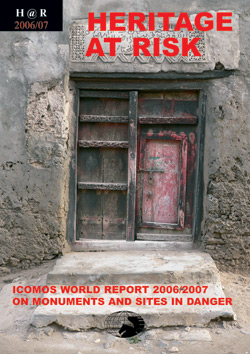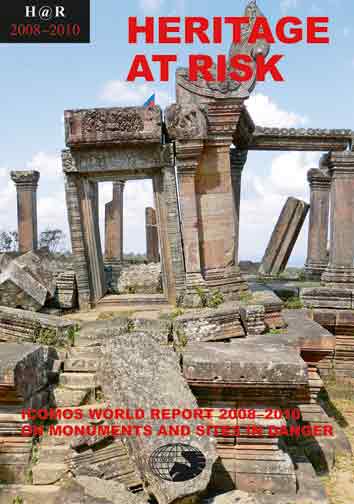ICOMOS World Report 2006-2007 on Monuments and Sites in Danger
Edited by Michael Petzet and John Ziesemer
The new World Report 2006/2007 on Monuments and Sites in Danger provides a broad spectrum of threats in the different regions of the world. Apart from 40 National Reports there are also current reports on cross-national topics, such as endangered rock paintings in North Africa and Australia, threats to vernacular architecture or to our archaeological heritage. Many of the threats discussed in the previous Heritage at Risk reports still exist, for instance dam projects in Turkey or threats to cultural heritage caused by military conflicts in Iraq and the Near East. Often conservation concerns are being sacrificed for purely commercial interests. This is being demonstrated for example by skyscraper projects in St Petersburg, Prague, Istanbul or Vienna exceeding all traditional dimensions or by the disfigurement of historic town quarters and cultural landscapes in countries such as Hungary, Romania or Moldova.
For the first time, the World Report 2006/2007 also contains a number of studies dealing with the effects of the worldwide climate change on our cultural heritage. Case studies demonstrate how different world regions, for instance the Canadian coastline, the Antarctic and Southern Europe, are already affected by climate change. Being aware of this interaction between natural and cultural heritage, ICOMOS has increased its commitment in Brazil by recently declaring the tropical rainforest of Amazonia a "monument of nature".
ICOMOS World Report 2006/2007 on Monuments and Sites in Danger Full Version
Hard copy
The complete report can be obtained in hard copy (free, except for the postage) from the ICOMOS Documentation Centre. Contact: documentation[at]icomos.org
Introduction
- Foreword by Françoise Rivière, Assistant Director-General for Culture, UNESCO, Paris (EN/FR/ES)
- Introduction by Michael Petzet, President of ICOMOS (EN/FR/ES)
National Reports
All National Reports in one file
- Algeria: Mausoleum of Medracen in danger
- Argentina: Development pressures in cities
- Armenia: Castle Amberd
- Australia: Trends affecting Australia’s heritage at risk / Areas of inadequate policy responses
- Austria: High-rise buildings behind Belvedere Palace in Vienna – project for the area Main Station Vienna / Roof alteration to the department store Kastner & Öhler – an attack on the roofscape of Graz
- Azerbaijan: Destruction of the Armenian cemetery at Djulfa – continued Belarus: State of preservation of the historic city of Hrodna //"
- Brazil: Amazonia, monument of nature
- Bulgaria: Heritage in danger
- China: Government tackling Three Gorges’ hidden environmental threats
- Cyprus: The archaeological site on the hill of Agios Georgios (PA.SY.D.Y), Nicosia / Palaion Demarcheion, Nicosia / Akanthou – Liastrika / The Neolithic site of Apostolos Andreas – Kastros / Famagusta 2007: An appeal for international cooperation
- Czech Republic: Prague, high-rise buildings on Pankrac Plain
- Ecuador: Reconstrucción de la Torre-Campanario de la Compañia de Jesus en Quito / Ampliación del Palacio del Congreso Nacional
- Georgia: Jvari (Holy Cross) Monastery in Mtskheta
- Germany: Dresden, Waldschlösschen bridge / Museum Island Berlin / Historic centre of Stralsund / Upper Middle Rhine Valley / Bauhaus and its sites in Dessau / Protest against the demolition of the Telephone Cable Factory in Oberschöneweide (Berlin) / The mining destruction of Heuersdorf and threats to Nietzsche’s gravesite / Ochsenfurt: old bridge across the river Main threatened by demolition / Against the total commercialisation of the Olympic Park in Munich
- Greece: The Ancient Diolkos
- Hungary: ICOMOS Hungary’s “Historic Preservation Lemon Awards” / The improper paths of urban and real estate development / Report on the condition of the Old Jewish Quarter of Pest
- India: The temple sites at Telkupi (“Bhairavasthan”) – Jaina architectural remains submerged by Panchet Dam in Jharkhand and West Bengal / Rama Setu and Setusamudram project – Protest against channel passage through Adam’s Bridge / Successful protest against six-lane road proposed close to Humayun’s Tomb in New Delhi
- Iran: Earthquake damages
- Iraq: Attack against the Askariya Shrine (Golden Dome) in Samarra / The ongoing looting of Iraq’s cultural heritage
- Israel: Preliminary damage assessment report: Israel heritage after the 2006 war
- Italy: Environmental and monumental SOS from Florence / The work of Franco Minissi at the Roman Villa in Piazza Armerina in danger
- Japan: Appeal against the destruction of the fishing port Tomo-no-Ura (Fukuyama City, Hiroshima Prefecture) / Protest against a high-rise building near Genbaku Dome in Hiroshima
- Kenya: Mtwapa heritage site / Qorahey wells
- Lebanon: Cultural heritage threatened by the war in Lebanon 2006
- Lithuania: Lithuanian manor heritage and its protection problems
- Luxemburg: Le pont Adolphe
- Mexico: La pérdida de la arquitectura de adobe en México
- Moldova: Chisinau – A historic city in the process of disappearing
- Norway: Climate change and the effect on Norwegian World Heritage sites / Coastal heritage / Churches / Hydro power and large-scale industry in Odda
- Oman: Mirbat, Heritage at Risk
- Peru: Patrimonio en PeligroPatrimonio en Peligro / Peruvian earthquake damages
- Romania: Hope for Rosia Montana?
- Russia: 20th-century heritage at risk in Moscow and the former Soviet Union / Visual integrity of St Petersburg threatened by Gazprom project / Wooden historic houses in Tomsk, Siberia / Paintings of the dwelling houses in the Russian north (Archangel Region)
- Serbia: Protest against the demolition of the National Theatre in Subotica
- Slovakia: Bratislava – protected area of central urban district at risk / Risk from development: threats to monuments caused by ignoring valid legislation
- Spain: Toledo and its setting: World Heritage in danger / Possible impact of the Spanish high-speed train (AVE) on the Church of the Sagrada Familia in Barcelona / Sobre la incidencia del proyectado nuevo teatro, auditorio y centro cultural de Lugo en la muralla romana de la ciudad y su entorno, bien del Patrimonio Mundial / Seville: Comments on the planned construction of a skyscraper by Cesar Pelli
- Thailand: Cooperation on cultural heritage conservation
- Turkey: The effects of rehabilitation projects on historic districts in Istanbul / Modern architectural heritage at risk / Construction of dams / The remains at Ani / Adobe architecture / Hasankeyf, a site threatened by the Ilisu Dam project / The flooding of Allianoi, a Roman bath complex / Istanbul – Risks in the historic urban topography?
- United States of America: The 11 most endangered historic places in the United States
Thematic Reports
All Thematic Reports in one file
- Rock Art at risk
- Neolithic and Bronze Age lakeside settlements in the Alpine region. Threatened archaeological heritage under water and possible protection measures – examples from Switzerland and Southern Germany
- Cultural landscapes of vernacular architecture in extreme danger / Paisajes culturales de arquitectura vernácula en riesgo extremo
- The World Heritage Convention and the buffer zone
- Logistic and other factors constraining conservation of heritage sites in Antartica
Special Focus: Global Climate Change
Special Focus section in one file
- ICOMOS climate change initiatives: a cooperative project with international committees
- Global Climate Change: every cultural site at risk?
- Landscape heritage, biosphere change, climate change and conservation
- Archaeological heritage management, climate change and World Heritage in the 21st Century
- The effects of climate change on cultural heritage in the Polar Regions
- Case Study: Captain Robert Falcon Scott’s 1910-13 British Antarctic expedition hut at Cape Evans
- York Factory – National Historic Site of Canada, Kichewaskahikun (Cree) (“The Great House”)
- Summary of the significance of and threats to cultural resources located at the historic settlement area on Herschel Island Territorial Park of Yukon
- Impact of the climate change on the frozen tombs in the Altai Mountains
- Climate change, fire and cultural heritage in Australia
- Heritage and global climate change: summer fires in Greece. The case of Olympia
- New Orleans, Hurricane Katrina, and global climate change






